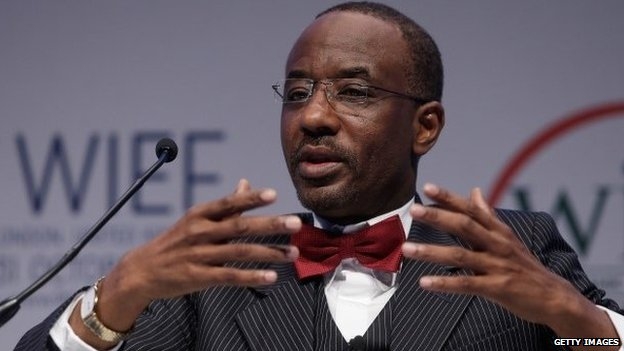Nigerian security agents have seized the passport and are plotting to arrest the internationally respected banker who was ousted as Central Bank governor after he revealed that billions of petrodollars are missing from the treasury, a friend and former Cabinet minister said Friday.
The agents who seized Lamido Sanusi's passport at Lagos airport Thursday said they were "acting on orders from the villa in Abuja," meaning Aso Rock Villa that is the president's office and official residence, said Nasir El-Rufai, a former minister for the capital territory who is now in the opposition.
Sanusi's lawyers are filing suit for alleged breach of his right to free movement and for threats of arrest and malicious prosecution without basis, El-Rufai told The Associated Press. El-Rufai said his and Sanusi's contacts at State Security have tipped them off that agents have obtained a warrant to arrest Sanusi.
The spokeswoman for the State Security Service, Marilyn Ogar, did not respond to requests for comment.
President Goodluck Jonathan on Thursday ousted Sanusi, accusing him of "financial recklessness and misconduct."
Critics say Sanusi was ousted because he exposed some $20 billion in missing petrodollars that they suspect could be used to fund campaigning for presidential and legislative elections next February.
Nigeria's naira currency, of which Sanusi was a staunch defender, immediately fell from 163 to 169 to the dollar, in what analysts said is the biggest fall since a 2009 devaluation.
Sanusi said he will challenge the suspension in court, not because he wants the job back, but because it threatens the independence of future Central Bank governors. He spoke in an interview with Channels TV aired Friday.
Sanusi had planned to step down when his five-year term expired in June, so Jonathan's action is seen by critics as a punishment of the man some thought protected by his aristocratic heritage as heir apparent to the Emirate of Kano, among the oldest caliphates in West Africa.
The 52-year-old career banker and Islamic scholar has acknowledged that he made powerful enemies as he cleaned up Nigeria's banking system and then set his sights on the powerful Nigeria National Petroleum Corp., the state body that manages the petroleum responsible for more than 80 percent of government revenue.
Jonathan's move comes three weeks after Sanusi made a damning presentation to the Senate Committee on Finance, detailing allegations of how the corporation has kept more than $20 billion in oil revenues from the national treasury, from petroleum lifted only between January 2012 and July 2013. Going further back, or forward, would obviously increase the amount missing, Sanusi said.
A memorandum he read to senators on Feb. 3, obtained by the AP, recommends sweeping changes to end opaque arrangements, including ones that Sanusi said show the corporation has been "acquiring assets belonging to the federation and transferring the income to private hands."
"It will ultimately, if not stopped, bring the entire economy to its knees," he warned.
The corporation has denied the charges, but Sanusi told senators that "We cannot trust the NNPC or its management to tell us the truth."
He noted that the corporation has not published audited accounts for years and repeated efforts to investigate its revenues by government-appointed chartered accountants have been stonewalled by a failure to produce documents.
El-Rufai said Sanusi got the news that he had been ousted while he was attending a conference in neighboring Niger in his capacity as Central Bank governor.
He returned to Lagos on a chartered jet, and to the reception by the State Security Service.





